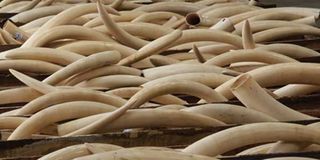Court quashes ivory kingpin’s conviction

What you need to know:
- Kenyan national Feisal Mohamed Ali was described as a most wanted organised crime mastermind in East Africa before he was arrested in Dar es Salaam and extradited to Kenya.
Dar es Salaam/Nairobi. A Kenyan court has quashed a 20-year jail term handed to an ivory smuggling kingpin who was arrested in Tanzania in 2014.
Kenyan national Feisal Mohamed Ali was described as a most wanted organised crime mastermind in East Africa before he was arrested in Dar es Salaam and extradited to Kenya.
The case in Kenya has been seen as a test of the country’s will to take on rampant poaching.
Ali was sentenced in July 2016 after prosecutors presented him as the head of an organised crime network that spanned African wildlife parks and buyers in Asia, the primary destination for poached ivory.
He appealed against his conviction and sentencing, and Mombasa High Court judge Dora Chepkwony last Friday rejected the sentence passed by the lower court two years ago as “unconstitutional”.“The evidence relied on to convict the accused person has a lot of gaps and doubts,” she said.Ali was arrested in Tanzania in 2014 in connection with two tonnes of ivory – 228 whole tusks and 74 pieces – found in a Mombasa warehouse.
The then Deputy Director of Criminal Investigations, Mr Diwani Athumani, told The Citizen that Ali was extradited to Kenya where he was wanted for various crimes, including ivory smuggling.He said Ali had been in Tanzania illegally after entry documents he claimed were in Tanga could not be traced.
He was driven to Tanga under tight security and later handed over to Kenyan authorities at the Horohoro border post.
During his trial in Kenya, the prosecution put the value of the ivory at $4.2 million (Sh9.2 billion).
The Kenya Wildlife Service hailed the “landmark” judgement against him, which included a fine of Ksh20 million (Sh440 million).
Three months earlier, Kenya carried out the largest-ever burning of ivory, including 105 tonnes from thousands of dead elephants, in a grand gesture aimed at shocking the world into stopping the slaughter of the animals.
Africa is home to between 450,000 to 500,000 elephants, but more than 30,000 are killed every year on the continent to satisfy demand for ivory in Asia, where tusks sell for around $1,000 (Sh2.2 million) a kilo.
In Tanzania, Ali was arrested in a sting operation involving officers from Kenya’s Directorate of Criminal Investigation working with their counterparts in Tanzania, under the auspices of Interpol.
The arrest was the culmination of the six-month long undercover trail since Ali escaped to Tanzania to avoid being charged after he was linked to the seizure of 2,152 kilogrammes of ivory in the coastal town.
Police initially said Ali had for more than a decade controlled a vast network but there was no evidence to pin him down since most of his wealth is traced to legitimate businesses.
He was placed top among nine suspected kingpins targeted in what was dubbed Operation Infra (International Fugitive Round Up and Arrest).




